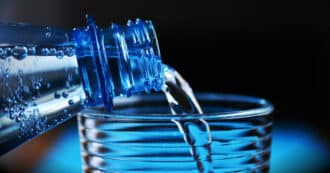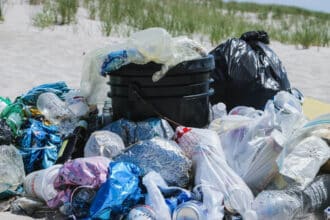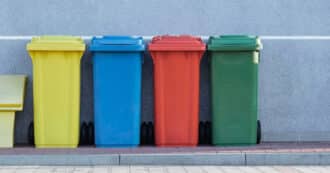By Harry Cooper – Humanity’s constant use of plastic bottles, packaging, and all kinds of single-use plastic products has created massive amounts of plastic pollution on our planet. As this plastic problem continues to grow, scientists everywhere are beginning to look for creative solutions.
The Plastic Pollution Problem
One of the biggest issues with plastic is that it is deadly for any animal to consume. However, recent discoveries have found that there are some naturally occurring bacteria capable of breaking down plastic.
These bacteria could provide a way to naturally degrade plastic. However, there are some limitations to its ability to break down plastic waste.
These bacteria can only break down specific types of plastic. They are also unable to break it down into a form that would not be harmful to other animals.
However, these bacteria are a very new discovery. As science and research into these bacteria continues to advance, we may see more practical applications of these bacteria to help eliminate plastic waste.
Ideonella Sakaiensis
In 2016 in in Sakai, Japan, a team of researchers investigating sludge from a recycling plant made an incredible discovery. They found bacteria that can eat plastic.
This bacteria was named Ideonella Sakaiensis. It produces plastic eating enzymes capable of breaking down PET plastic.
Polyethylene terephthalate plastic, PET plastic, is one of the most common varieties of plastic, and is usually marked with a one inside a recycling symbol. While it can easily be recycled, massive amounts of PET plastics still end up in landfills, on the ground, or in the ocean.
However, with the recent discovery of plastic eating organisms many believe that they could help provide a solution to environmental plastic pollution. Although as it is a very recent discovery, there are some hurdles to using plastic eating bacteria to get rid of plastic on a larger scale.
Challenges to Using Plastic Eating Bacteria
Bacteria and other decomposers have had millions of years to evolve to decompose organic matter such as wood and flesh efficiently. Plastic, on the other hand, has only been around for a matter of decades, and bacteria are only just now being capable of breaking it down.
This means that plastic eating bacteria such as Ideonella Sakaiensis are not as capable at breaking down plastic as we would hope. In order to use them on an industrial scale to make a considerable impact on our plastic problem, there are several challenges we will have to deal with.
The Bacteria Only Break Down PET Plastic
PET plastic represents a considerable chunk of the plastic waste problem. However, it is only one of six different types of plastic.
One of the biggest issues with plastic eating bacteria is that it can only break down one form of plastic. No bacteria have yet to be found that are capable of breaking down the other six forms of plastic.
However, scientists are constantly researching different ways to improve plastic eating bacteria. Many have tried genetic engineering to make the bacteria more efficient and capable of degrading plastic waste.
Bacteria Can’t Fully Break Down Plastic
Bacteria capable of breaking down plastic may sound like an easy way to make plastic magically disappear. However, the reality of the situation is not as ideal.
In order for plastic to be completely harmless in the environment, it would need to be broken down into their elemental building blocks, carbon and hydrogen. Plastic eating bacteria is only capable of breaking plastic down into smaller plastic monomers.
This can help get rid of larger pieces of plastic waste. However these plastic monomers are still harmful to humans and the environment.
The Future of Plastic Eating Bacteria
There are several limitations to using plastic eating bacteria at an industrial scale. However scientists are continuing to research different ways to use plastic eating bacteria, and have already found a few practical applications.
Plastic eating bacteria are only capable of breaking down PET plastic into plastic monomers. While these still cause harm in the environment, plastic monomers can be more easily turned into new plastic.
Therefore, these bacteria can’t be used to fully break down plastic. But they can be used in recycling plants, to make the process of recycling plastic much easier.
Scientists doing research into using genetic engineering on Ideonella Sakaiensis could create bacteria capable of producing more efficient plastic degrading enzymes. These genetically engineered bacteria could potentially be able to breakdown other kinds of plastic, as well as break them down more fully. By continuing research into plastic eating bacteria, scientists are finding more natural and efficient ways to solve our plastic problem.
Plastic Eating Bacteria From A Religious Perspective
While the discovery and culturing of plastic eating bacteria might seem like an excellent solution to our plastic crisis, we must also be careful about “playing God.” After all, if we want to cultivate these plastic eating bacteria to work even more efficiently, we might end up creating a much bigger problem. Emily Flashman warns us about this danger in the journal, “The Conversation:”
There is one worry, though. While any modified bacteria used in bioreactors are likely to be highly controlled, the fact that it evolved to degrade and consume plastic in the first place suggests this material we rely on so heavily may not be as durable as we thought.
If more bacteria began eating plastic in the wild then products and structures designed to last many years could come under threat. The plastics industry would face the serious challenge of preventing its products becoming contaminated with hungry micro-organisms.
It’s a scary thought to consider highly-efficient plastic eating bacteria escaping into the world and destroying our civilization’s plastic-based infrastructure. Perhaps instead of trying to clean up our plastic problem and potentially create new ones, we should get to the source of the problem, and reduce our consumption of disposable plastics.
Just like with medication, if we don’t address the root cause of illness, we might end up taking pill after pill to endlessly address side-effects. May God help us break our addiction to disposable plastic and save us from ourselves.
* Featured image source








